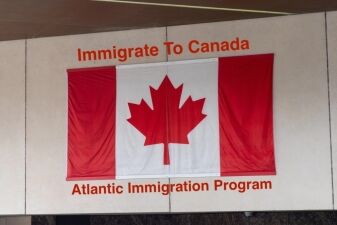Jobs
Canadian Census Metropolitan Areas Latest Unemployment Rates

Last Updated On 27 August 2024, 9:49 AM EDT (Toronto Time)
The Government of Canada announced that they will be freezing the processing of low-wage LMIAs for Census Metropolitan Areas (CMAs) with an unemployment rate of 6% or above.
This freeze on processing low wage LMIAs will come into effect on September 26, 2024, and many readers have reached out to confirm which CMAs will fall under this freeze.
It is important to keep in mind that the freeze on low-wage LMIAs will be applicable to the entire province of Quebec effective September 3, as the province demanded it and was the one to trigger the change for the rest of Canada.
One or more nearby municipalities centred on a population centre (referred to as the core) with a total population of at least 100,000 make up a census metropolitan area (CMA).
So there can be multiple cities that fall under a given CMA. For example, Windsor CMA includes Windsor, Lakeshore, LaSalle, Tecumseh, and Amherstburg.
In order to better understand, our team put together a full list of CMAs and their unemployment rates from Statistics Canada as of July 2024.
Canadian Census Metropolitan Areas latest unemployment rates
Below is the full list of CMAs with the latest unemployment rates as of July 2024.
You can click on any of the CMAs listed to see the map showing the areas included in that particular CMA.
| Census Metropolitan Areas (CMAs) | July 2024 | June 2024 | July 2023 | Year-on-Year Change | Month-on-Month Change |
|---|---|---|---|---|---|
| Windsor, Ontario | 9.1% | 9.1% | 5.8% | 3.3% | 0% |
| Saint John, New Brunswick | 8% | 8.3% | 5.6% | 2.4% | -0.3% |
| St. Catharines-Niagara, Ontario | 8% | 8.4% | 6% | 2% | -0.4% |
| Edmonton, Alberta | 8% | 7.1% | 6.1% | 1.9% | 0.9% |
| Toronto, Ontario | 7.7% | 7.8% | 6.4% | 1.3% | -0.1% |
| Calgary, Alberta | 7.6% | 8.5% | 6.3% | 1.3% | -0.9% |
| St. John’s, Newfoundland and Labrador | 7.4% | 7.7% | 6% | 1.4% | -0.3% |
| Hamilton, Ontario | 7.2% | 7.3% | 5.3% | 1.9% | -0.1% |
| Oshawa, Ontario | 6.7% | 6% | 5.5% | 1.2% | 0.7% |
| Regina, Saskatchewan | 6.6% | 7% | 4.6% | 2% | -0.4% |
| Kitchener-Cambridge-Waterloo, Ontario | 6.5% | 6.2% | 5.9% | 0.6% | 0.3% |
| London, Ontario | 6.5% | 6.2% | 5.1% | 1.4% | 0.3% |
| Ottawa-Gatineau, Ontario part, Ontario/Quebec | 6.3% | 6% | 4.7% | 1.6% | 0.3% |
| Abbotsford-Mission, British Columbia | 6.3% | 6% | 5.1% | 1.2% | 0.3% |
| Barrie, Ontario | 6.2% | 5.8% | 4.6% | 1.6% | 0.4% |
| Kingston, Ontario | 6% | 5.3% | 3.8% | 2.2% | 0.7% |
| Brantford, Ontario | 6% | 5.7% | 4.4% | 1.6% | 0.3% |
| Moncton, New Brunswick | 5.9% | 5.3% | 5.4% | 0.5% | 0.6% |
| Greater Sudbury, Ontario | 5.9% | 5.7% | 4.8% | 1.1% | 0.2% |
| Halifax, Nova Scotia | 5.8% | 5.8% | 6.7% | -0.9% | 0% |
| Belleville, Ontario | 5.8% | 6.2% | 10.2% | -4.4% | -0.4% |
| Vancouver, British Columbia | 5.8% | 5.6% | 5.5% | 0.3% | 0.2% |
| Winnipeg, Manitoba | 5.4% | 5% | 4.9% | 0.5% | 0.4% |
| Saskatoon, Saskatchewan | 5.2% | 5.3% | 4.8% | 0.4% | -0.1% |
| Lethbridge, Alberta | 4.8% | 5.1% | 5.6% | -0.8% | -0.3% |
| Kelowna, British Columbia | 4.4% | 3.9% | 2.9% | 1.5% | 0.5% |
| Guelph, Ontario | 3.9% | 3.7 | 4.4% | -0.5% | -3.661 |
| Victoria, British Columbia | 3.6% | 3.8% | 3.6% | 0% | -0.2% |
| Peterborough, Ontario | 3.2% | 3.2% | 6% | -2.8% | 0% |
| Thunder Bay, Ontario | 3% | 3% | 4.3% | -1.3% | 0% |
What are the Census Metropolitan Areas in Ontario?
Toronto
Ottawa – Gatineau
Hamilton
Kitchener – Cambridge – Waterloo
London
St. Catharines – Niagara
Windsor
Barrie
Kingston
Greater Sudbury
Guelph
Brantford
Peterborough
Thunder Bay
Belleville – Quinte West
What are the areas included in Toronto Census Metropolitan Area?
City of Toronto, Mississauga, Brampton, Markham, Vaughan, Oakville, Richmond Hill, Milton, Ajax, Pickering, Newmarket, Caledon, Halton Hills, Aurora, Whitchurch-Stouffville, Georgina, New Tecumseth, Bradford West Gwillimbury, East Gwillimbury, Orangeville, King, Uxbridge, and Mono are the part of Toronto CMA.
What are the Census Metropolitan Areas in British Columbia?
Vancouver
Victoria
Kelowna
Abbotsford – Mission
Nanaimo
Kamloops
Chilliwack
What are the CMAs in Alberta?
Calgary
Edmonton
Lethbridge
Red Deer
What are the sectors exempted from the freeze on low-wage LMIA processing?
Jobs in sectors critical to food security, including primary agriculture, food processing, and fish processing, as well as in construction and healthcare.
Kamal Deep Singh, RCIC (Regulated Canadian Immigration Consultant) licensed by CICC (formerly known as ICCRC) with member number R708618. He brings extensive knowledge of immigration law and new changes to rapidly evolving IRCC.
You may also like: New Alberta Child and Family Benefit Payment To Be Sent On August 27
In-Demand Skilled Trade Jobs In Ontario | New List
New ChatGPT 4o based AI Chat Launched By Immigration News Canada





















